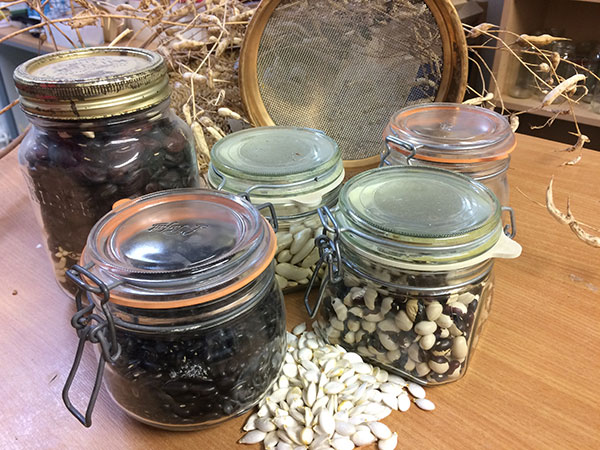Canguil, tostado, humita, chuchuca, tortilla, champús. These ancient types of maize have fascinated Javier Carrera for as long as he can remember.
Carrera is an agroecological farmer and seed guardian based in Ecuador who ‘rescues’ heritage grains and ancient plant crops. “The only way to save these seeds is to get people to use them,” says Carrera, who founded the Seed Guardian Network (Social en la Red de Guardianes de Semillas) in 2002.
But his project is really the opposite of a conventional seed bank collection. His policy is to never keep seeds for more than a year and instead he plants, grows and harvests them. But the creation of a new market for traditional varieties now hinges on cultural re-education.

Farming cultures across the Andes region, the mountain range that stretches from Ecuador down to Chile, focus on maize: “The diversity of maize, both [in terms of] seed diversity and culinary uses is astounding,” he describes. “In Ecuador, we cultivate maize from sea level up to altitudes of 3,200m. But now we’re in trouble because diversity is being lost.” Out of more than 300 maize varieties that were grown in Ecuador in the 1960s, he and his guardians can only find 50. The rest have gone forever.
“We can’t go back in time but we need to increase the diversity we have in our food system,” says Carrera, who explains that Ecuador is heavily reliant on imports of maize as feed for poultry, but the production of maize for human consumption is still met by small farmers in Ecuador.
Carrera worries that hunger would skyrocket if imports stopped and the poultry industry collapsed. “Ideally, we shouldn’t have this big commercial poultry industry – we need to integrate animals into ecosystems through small-scale agroecological farms.”
He wants to reinstate native crops in his home country, many of which are so well-adapted to the landscape. Despite the cultivation of thousands of types of plants since agriculture began 12,000 years ago, today just three – wheat, rice and maize – account for almost half of the world’s calorie intake, making our food systems incredibly vulnerable once climates change beyond the limits of these crops.

Better food production depends on locally-adapted seeds that suit those specific conditions, especially in a place like Ecuador where the climate varies dramatically from jungle to desert to mountains and glaciers. Carrera’s ancestral seed campaign focuses on saving 10 particularly endangered plant species, from certain heritage varieties of corn, miso, maize and potato to the papayuelos or ‘mountain pawpaw’.
Chefs are encouraged to visit farms and food forests owned by the 100 or so seed guardians involved in his project in order to inspire more people to develop new recipes and cook up a modern market for these foods.
Later this month, Carrera will launch a new online agroecology course but he’s also keen to reach out to a much wider audience beyond growers and farmers. “We need to join Twitter with tradition,” he says. ‘There’s such a wealth of knowledge amongst the indigenous grandmothers we work closely with who farm these ancient food forests but now it’s time this got shared more widely.”
Ownership is a big issue and Carrera believes that seed diversity needs to be relocalised: “Throughout the 20th century, this push for monopolisation by big corporations and a concentration of power and resources is partly what’s making us an endangered species. We need to decentralise governments, energy, food systems, everything and obviously seeds are part of that.”
In seemingly stark contrast to the Ecuadorian Seed Guardian Network, Kew’s Millennium Seed Bank in the UK is a vast underground treasure trove home to more than 2.3 billion seeds from 97 countries that are stored in fire-, bomb-, radiation- and flood-proof vaults. But rather than this simply being a museum of seeds, scientists here are in fact combining both ‘in situ’ lab research with ‘ex situ’ growing projects in various locations around the world.
These approaches to the conservation of wild native plants are complementary according to Dr Tiziana Ulian, a plant ecologist at the Millennium Seed Bank who heads up the Useful Plants Project.

Her team collects seeds, researches the biology of these plants and works closely with local communities to grow these seeds in their native environment across Africa and Mexico. “It’s a collaboration and we take a participatory approach,” says Ulian. “These native species have a wider genetic diversity and they’re better adapted to the local landscapes and climates. Let’s help local communities through the research and really cultivate these local species.”
Endangered plants could be our future foods, as well as biofuels, medicines and materials, but above all, every single seed has an inherent value to its own native ecosystem.
Rather than relying on dominant global seed banks, Carrera’s vision is to have thousands of small, local seed libraries in order to guarantee future food security: “If people don’t have direct access to seed libraries in their local towns, they’ll never be self-sufficient,” he argues.
“Each tree nursery and food forest is ultimately a seed bank.” As such, the process of seed saving can be dynamic, creative and collaborative. “Yes, and beautiful,” adds Carrera.
Hear Javier Carrera speak about his campaign to save ancestral maize varieties online as part of the Oxford Real Farming Conference on Monday 11 January 6pm.









0 Comments